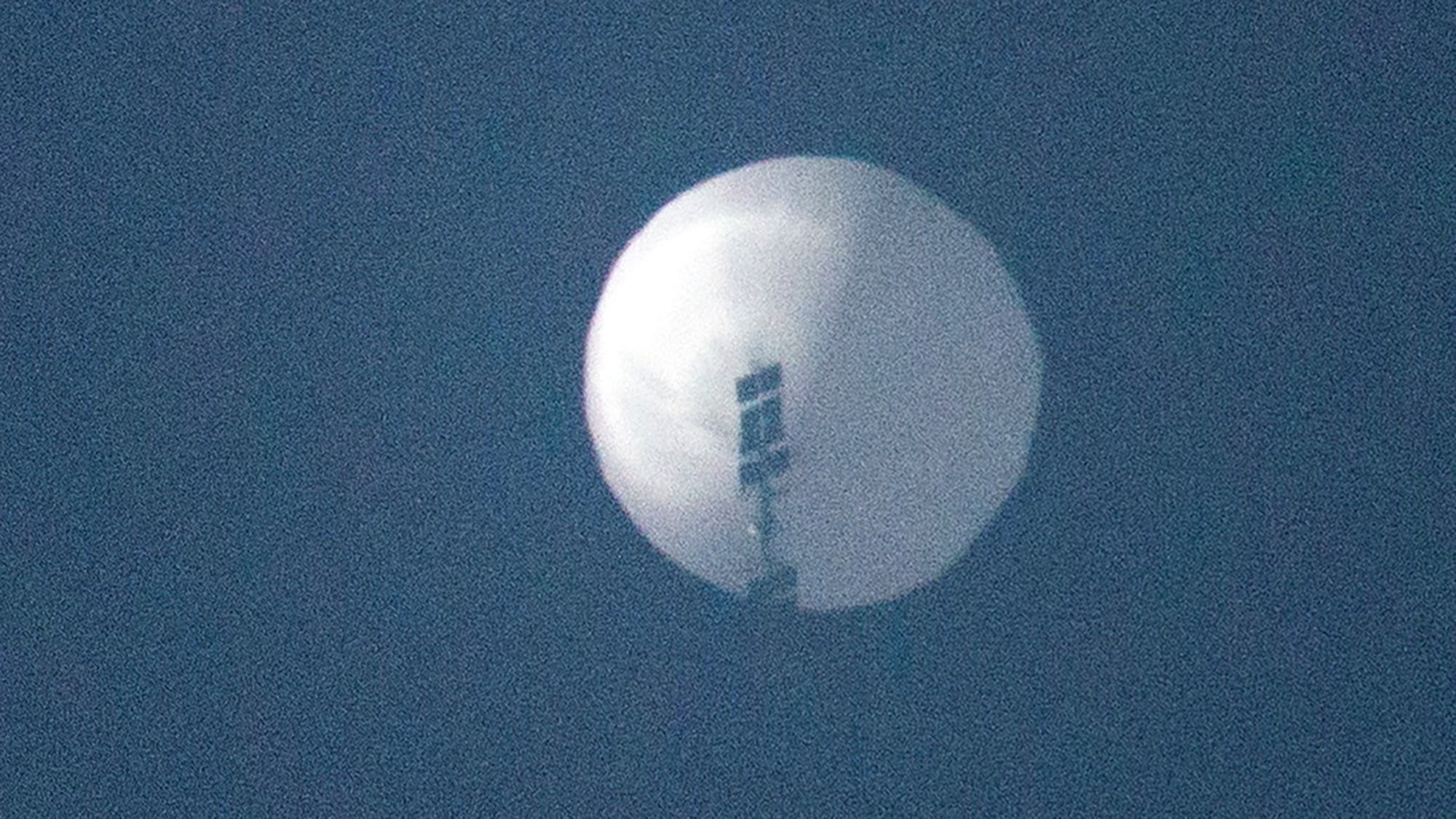China balloon: US shoots down airship over Atlantic
The US has shot down a giant Chinese balloon that it says has been spying on key military sites across America.

The Department of Defence confirmed its fighter jets brought down the balloon over US territorial waters.
China's foreign ministry later expressed "strong dissatisfaction and protest against the US's use of force to attack civilian unmanned aircraft".
Footage on US TV networks showed the balloon falling to the sea after a small explosion.
An F-22 jet fighter engaged the high-altitude balloon with one missile - an AIM-9X Sidewinder - and it went down about six nautical miles off the US coast at 14:39 EST (19:39 GMT), a defence official told reporters.
Defence officials told US media the debris landed in 47ft (14m) of water - shallower than they had expected - near Myrtle Beach, South Carolina.
The military is now trying to recover debris which is spread over seven miles (11km). Two naval ships, including one with a heavy crane for recovery, are in the area.
In a Pentagon statement a senior US defence official said that "while we took all necessary steps to protect against the PRC [China] surveillance balloon's collection of sensitive information, the surveillance balloon's overflight of US territory was of intelligence value to us.
"We were able to study and scrutinise the balloon and its equipment, which has been valuable," the official added.
US President Joe Biden had been under pressure to shoot it down since defence officials first announced they were tracking it on Thursday.
Afterwards, Mr Biden said: "They successfully took it down, and I want to compliment our aviators who did it."
In a statement a few hours later, the Chinese foreign ministry said: "The Chinese side has repeatedly informed the US side after verification that the airship is for civilian use and entered the US due to force majeure - it was completely an accident."
The discovery of the balloon set off a diplomatic crisis, with US Secretary of State Antony Blinken immediately calling off this weekend's trip to China over the "irresponsible act".
The Chinese authorities have denied it is a spying aircraft, and instead said it was a weather ship blown astray.
Reacting to the incident, Taiwan's foreign ministry said in a statement: "The Chinese Communist Party government's actions that violate international law and violate the airspace and sovereignty of other countries should not be tolerated in a civilised international community."
China considers self-ruled Taiwan a breakaway province that will eventually be under Beijing's control. President Xi Jinping has not ruled out the possible use of force to achieve this.
But Taiwan sees itself as independent, with its own constitution and democratically-elected leaders.
President Biden first approved the plan to down the balloon on Wednesday, but the Pentagon said it had decided to wait until the object was over water so as not to put people on the ground at undue risk.
Groundwork for the operation was laid when the US Federal Aviation Administration (FAA) briefly paused all civilian flights at three airports around the South Carolina coast on Saturday afternoon because of a "national security effort".
The coast guard also advised mariners to leave the area due to military operations "that present a significant hazard".
An eyewitness on the coast, Hayley Walsh, told BBC News she saw three fighter jets circling before the missile was fired, then "we heard a huge boom, the house shook".
One senior military official told CNN the recovery of debris should be "fairly easy" and could take "relatively short time". The official added that "capable Navy divers" could be deployed to assist in the operation.
Defence officials also revealed on Saturday the balloon had first entered US airspace on 28 January near the Aleutian Islands, before moving to Canadian airspace three days later, and re-entering the US on 31 January. The object was spotted in the US state of Montana, which is home to a number of sensitive nuclear missile sites.
Relations between China and the US have been exacerbated by the incident, with the Pentagon calling it an "unacceptable violation" of US sovereignty.
Mr Blinken - America's top diplomat - told Beijing it was "an irresponsible act" ahead of his now-cancelled trip on 5-6 February - it would have been the first such high level US-China meeting there in years.
But China sought to play down the cancellation of his visit, saying in a statement on Saturday that neither side had formally announced a plan for a trip.
China's foreign ministry said Beijing "would not accept any groundless conjecture or hype" and accused "some politicians and media in the United States" of using the incident "as a pretext to attack and smear China."
On Friday, the Pentagon said a second Chinese spy balloon had been spotted - this time over Latin America with reported sightings over Costa Rica and Venezuela.
Colombia's Air Force says an identified object - believed to be a balloon - was detected on 3 February in the country's airspace at above 55,000ft.
It says it followed the object until it left the airspace, adding that it did not represent a threat to national security.
China has not yet commented publicly on the reported second balloon.
-bbc







